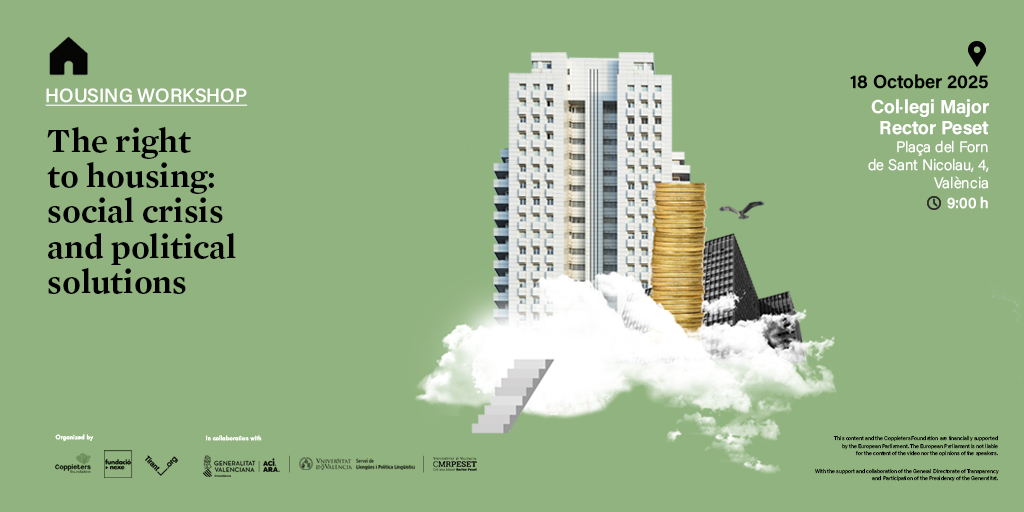The Right to Housing: Crisis and Social Solutions

Across Europe, access to safe, affordable, and sustainable housing is becoming increasingly difficult. More than 1 million people are currently homeless, and around 125 million Europeans cannot afford to heat their homes adequately. Skyrocketing rents, rising house prices, and insufficient social housing are creating a crisis that affects families, young people, and vulnerable communities alike. These challenges are not just numbers: they translate into daily struggles, insecurity, and social exclusion for millions of people.
In response to these mounting pressures, the European Union has appointed a Housing Commissioner and the European Parliament has established a special committee on the housing crisis. However, these measures are far from sufficient. Many experts, activists, and organizations argue that housing must be treated as a fundamental human right, rather than a commodity driven by profit. Without urgent and coordinated action, the crisis will continue to exacerbate inequalities, leaving low-income families at risk of eviction, energy poverty, and homelessness.
At the national and local level, the situation is equally pressing. Many households are struggling to pay rent or mortgages, often having to make impossible trade-offs between housing and other essentials like food, healthcare, or education. Energy poverty has become a widespread concern, particularly among lower-income families who cannot afford to keep their homes adequately warm during winter months. Homelessness is increasing in a large majority of Member States, and informal housing arrangements — from overcrowded apartments to precarious temporary shelters — are becoming more common.
Amid these challenges, community initiatives, NGOs, and social movements have stepped in to provide support, advocate for rights, and experiment with innovative housing solutions. These local efforts show that change is possible, but scaling up solutions requires dialogue, collaboration, and policy innovation at all levels — from the city council to the European Parliament.
The workshop “The Right to Housing: Crisis and Social Solutions”, to be held in València, is designed to provide a space for reflection, debate, and collective action. Bringing together local residents, activists, experts, and social organizations, the event aims to share experiences, explore creative approaches, and identify practical solutions to the housing crisis. Participants will have the opportunity to engage in keynote presentations, roundtable discussions, and participatory workshops, connecting diverse perspectives — legal, social, architectural, and policy-based — to develop actionable proposals.
By joining this workshop, attendees will contribute to a collaborative effort to promote housing as a right, not a privilege, and to shape policies and initiatives that ensure everyone has access to safe, adequate, and affordable housing. This event is more than a discussion — it is a step toward collective solutions that can transform the housing landscape in València, across Spain, and throughout Europe.
Program
18 October
Registration & Breakfast
Opening Session
Presentation of the workshop’s goals and welcome from the organizing team.
Keynote Conference: The Housing Crisis in Europe
Diagnosis of the current situation and proposals for joint action.
Speaker:
- Marie Hyland, Eurofound specialized researcher
Roundtable: Policy solutions for housing from different perspectives
Exploring legal, architectural, and social approaches to ensure fair and sustainable access to housing.
Speakers:
Elena Azkárraga, architect and former Director General of Housing, Generalitat Valenciana
Alicia Smedberg, representative, International Union of Tenants
Ferran Puchades, judicial secretary and councilor, Valencia City Council
Enrique Bueso, legal advisor, Association of Land and Public Housing Managers
Participatory Workshop: Developing Joint Housing Proposals
Collaborative session for attendees to share ideas, co-create solutions, and identify actionable steps to strengthen the right to housing.
Closing Session & Final Remarks
Summary of key insights from the day and discussion of future actions to advance the right to housing.
Concluding Remarks by:
- Xabier Macias, Vice President, Coppieters Foundation
- Elies Seguí, President, Fundació Nexe
- Gustau Pérez, President, ACV Tirant lo Blanc
Practicalities:
Date & time:
Saturday, 18 October 2025 – 09:00 – 13:45
Venue:
Col·legi Major Rector Peset, Plaça del Forn de Sant Nicolau 4, 46001 València, Spain
Language:
The event will be conducted in English, Spanish and Catalan. Interpretation will not be provided
Accessibility:
The venue is wheelchair accessible
Contact and press:
Media inquiries can be adressed to info@ideasforeurope.eu
. . .
This event is a joint initiative between Fundació Nexe and Coppieters Foundation.
Implemented in Collaboration With:
- Generalitat Valenciana – Aci Ara (Valencian Government initiative)
- Universitat de València
- Col·legi Major Rector Peset (CMRPESet)
. . .
This event is financially supported by the European Parliament. The European Parliament is not liable for the content of the event nor for the opinions of the speakers.
. . .
Thank you for following our activities over the past few years. We hope our updates have been useful to you. We would like to keep informing you about upcoming events, new publications, summer schools, and job vacancies. Subscribe to our newsletter to hear from us in your inbox.